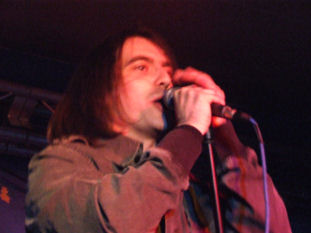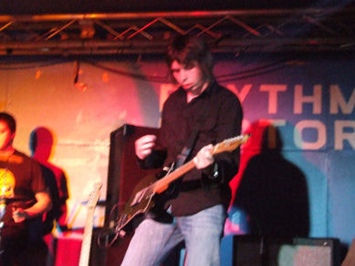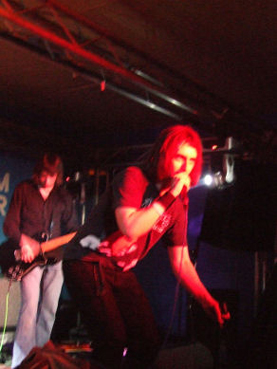
The Beat Poets
The Rhythm Factory
East London
7 June 2007
Words & Pix by Alissa Ordabai
(SugarBuzz London)
Forget Allen Ginsberg and Jack Kerouac because the Beat Poets are on a different kind of quest, despite their curiously deceptive name. This band is all about straightforward rock drive and certainly not the epicurean chaos of the late 1950s counter-culture bohemia. These guys are undoubtedly bohemians too, but of a different kind, drawing from the classic rock tradition more than any other formula.
The treasure trove of Irish rock history, from Taste and Thin Lizzy to U2, is probably the Beat Poets’ most obvious point of reference, but there are many layers to their material, punk and Eighties pop including, as well as original ideas of their own, which makes them a versatile modern band, despite their unmissable classic rock leanings.

The band’s set on the night was a confident, focussed voyage through different styles, starting with the best song the Beat Poets have written so far. “Staring the Stars Down” is an instantly enjoyable torch song with the melody, the harmony and the hypnotic vocals united in one moving piece of music, revealing the band’s quest for stadium rock glory. The song’s high-flown, fluent sound echoes U2’s inspired radiance, singer John Dinsmore’s voice sending out his call free and clear, making you instantly imagine this voice stirring waves in a 100,000-strong crowd.
“Bloodline”, another standout, was where the band continued their pursuit of texture and depth, taking the song beyond the straight-ahead rock format. “Bloodline” is a sad song, and, like all sad songs, is not easy to sing, a challenge that Dinsmore handled with competence and poise. What makes him an outstanding singer is not only his voice which is a blessing from nature, but even more the fact that his singing is completely sincere and heartfelt, a rare article on a scene full of mannered fakes.
“Supersonic Madness Parade” showcased the band’s other side, this time stretching their stylistic latitude in the direction of gritty guitar-driven rock. The hard-hitting growling riff hinted on the legacy of Rory Gallagher and his legendary band Taste, with the tough, firm rock-out drive taken to its bare-bones extreme. Even though the guitar is often prominent in this band, guitarist Marty Canavan deliberately chooses not to play solos, one part of the classic rock tradition that this band is plainly not interested in. Still, you hardly notice this peculiar fact because the Beat Poets are a fully developed band with tunes and riffs so powerful that you forget about the missing solos.

The band’s rhythm section is compact and functional, but still sustains the movement of the songs with concentrated resolve, allowing the vocals and the guitar to come through unhindered and clear. “Behind the Mask”, a punk-influenced song, was a great example of this approach, illustrating how the rhythm section sticks to the bare minimum, letting the vocals the guitar carry the message.
What makes the Beat Poets stand out among other revivalist bands is how they add confidence and imagination to the way they update the standards of classic rock. They do it with fire and conviction, excelling at what Irish rock musicians have traditionally been so staggeringly good at – giving a direct, moving and powerful rendition of human existence in the modern world. The industry can’t ignore such an evident talent, so hopefully the time when we hear John Dinsmore send his call through a stadium crowd is not that far ahead.